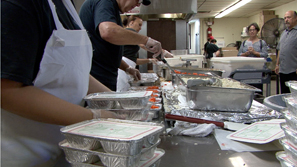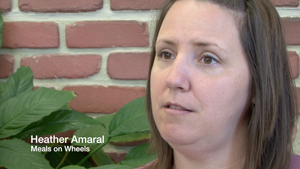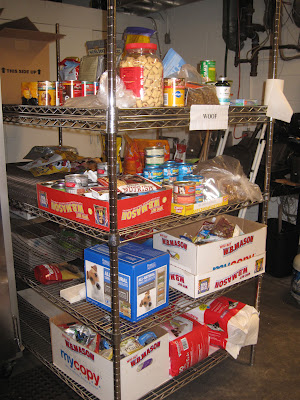AARP Hearing Center
En español
By Jody McPhillips and John Martin
Hungry in the West End addresses senior hunger in Providence's West End community -- an area of hard-core poverty burdened further by the recession. This series attempts to put a face on the problem of senior hunger in the West End and throughout America, and to give voice to those who are responding to the challenge of feeding the hungry. This is Part 3 of the series. Start here to begin with Part 1.
Imagine feeding a hot lunch to more than 1,500 people a day—people who live in different parts of Rhode Island, with different needs, tastes and health problems.
Now do it for only $3 per meal.
Meals on Wheels (MOW) pulls off this minor miracle five days a week, thanks to a squadron of cooks and kitchen workers, shoppers and dieticians, truck drivers and volunteers who get hot, fresh food to people all over Rhode Island. It is, to say the least, a challenge. Watch how they do it.

“You’re trying to please everyone, which is not really possible,” says Michael Marrocco, operations manager for Marra Meal Services in East Providence. “After all, I think my mother’s cooking is the best, but somebody else might not like it.”
Marra Meals prepares up to 1,700 meals a day in its professional catering kitchen in an East Providence industrial park. Summer or winter, sunshine or rain, the trucks roll. Only heavy snow disrupts the schedule, and when a storm is forecast, double meals are delivered the day before. For some, the visit from the MOW volunteer is the only human contact they’ll have all day.
However, we learned in the course of our reporting that some parts of Rhode Island are more easily served than others. The West End, because of language barriers and the fear of crime, presents special challenges.
Ride through the West End with Meals on Wheels driver Donald "Linc" Lincoln.
For many, the meals provide a lifeline that keeps people too frail to cook out of nursing homes.
The work starts early. The first shift of cooks and kitchen workers arrives around 4 a.m., and sets to work preparing the day’s meals, following a menu drawn up monthly. By 8 a.m., truckloads of red (hot) and blue (cold) insulated coolers are fanning out across Rhode Island.

A dozen salaried drivers transfer the coolers to a fleet of 70 volunteers who distribute the meals. The average volunteer route takes 90 minutes and visits 20 homes.
“We do our best to serve healthy, tasty, nutritious food,” says Heather Amaral, MOW’s executive director.
It’s not so easy.
Many homebound elderly have health problems like high blood pressure or diabetes, so the chefs have to limit fat, salt and spices, while coming up with meals that appeal to people of all ethnic backgrounds. They offer a daily alternative, so people have a better chance of finding something they like.
An average meal might include fruit juice, barbecued chicken, mashed potatoes, buttered corn, whole wheat bread and fresh fruit, while the alternate choice might be sliced pork au jus.
Marrocco’s favorite customer is the anonymous lady who sends back the monthly menu every month, with her opinion of each day’s offering carefully noted: “Good.” “Fair.” “Very good.” “It’s really helpful,” he says. Watch our interview with Michael Marrocco.
Amaral says a recent survey was encouraging. “We got 500 or 600 responses, and virtually all said the food was better than it was a year or two ago.”

About three-quarters of the meals go to private homes, with the rest served at “congregate” meal sites where people come together to eat, such as senior centers.
You don’t have to be poor to get Meals on Wheels, says Amaral. “You can qualify if you are 60 or older…at the congregate centers, the cut-off age is 55. In general, the people who go to the (congregate) sites are younger and in better shape.”
The suggested donation is $3 per meal, says Amaral, but in practice people chip in less. “The average we get is $1.60. That amount has decreased in each of the past three years. This year it is down 15 cents. It definitely tracks the economy.”
About 64 percent of MOW funding comes from government, the state share of which has been dropping in recent years. “At one point we were getting $403,000,” she says. By this year that hit a low of $181,000, but in the new budget it ticks back up to $200,000.
Making up the difference through donations is getting harder and harder, she says.
The agency gets about $400,000 in donations, including things like crackers, soaps and shampoos from supermarket drives.
Crime in the West End, Amaral agrees, makes reaching isolated hungry seniors more difficult. "Safety-wise, if we can't find a volunteer driving to got into (it), by default it will go into one of our paid driver routes."
Donald, "Linc" Lincoln, the paid driver who delivers meals in the West End, says it is a problem. " If you grew up outside and hearing about South Providence and the West End, and the drugs and the killing, it is a tough neighborhood. But if you are in it, you just gotta roll with the punches.
"Everybody's scared. We had a driver. He is white. He said he won't do South Providence -- he won't do West End. That's the way he grew up. He don't want toughness, you know what I'm saying? He don't want to look at anything he don't want to see."

Fear of crime cuts both ways. The Rev. Carl Balark, pastor of Ebenezer Baptist Church on Cranston Street in the West End says it has "a paralyzing effect." The atmosphere creates more than problems recruiting volunteers. Balark says it keeps people in need from reaching out for help.
"The church is planted here; we choose to worship here, and this is where we want to do our work," he says. "So, we try to get to know people. Getting to know people eradicates fear. it eradicates ignorance. It eradicates all of those things that keep us from doing what it is we need to do . But we have a way to go in that regard."
There’s a waiting list for home-delivered meals, which can be as long as six weeks unless someone is in dire straits, she says. “We do pull people out of line based on need, so you might wait a week or you might wait six.”
Amaral says people find it hard to come forward to say they need help. “We see two things—people tell us, ‘Yes, I can prepare a meal,’ but it’s not a healthy meal. It’s more like cereal and soup. There are a lot of reasons, including physical ability and fatigue. The result is, people are not eating properly for their health condition.” Watch our interview with Heather Amaral.

And even when they do get home-delivered meals, the food doen’t always reach the intended recipient. “The second thing is people who feed half their meals to their pets. It’s pretty obvious—the driver goes to pick up the coolers and the dishes are licked clean on the floor. It’s a quality of life issue. People love their pets." Ever flexible, Meals on Wheels has come up witsolution: its Pet Food Pantry (left), with an array of donated pet food and treats. Pet food is delivered along with the daily meal.
Research funded by the Meals on Wheels Foundation shows some surprising trends. As of 2010, more than 8 million Americans aged 60 or older worried about having enough to eat. The number who actually experienced hunger is lower, at 1.6 million—but that number is more than three times higher than it was in 2001.
“Those increases were most pronounced among the near-poor, whites, widows, non-metro residents, the retired, women, and among households with no grandchildren present,” says “Senior Hunger in America 2010: An Annual Report”.
The organization worries that more skipped meals means worse nutrition and exacerbation of chronic illness, which in turn leads to greater “limitations in activities of daily living.”
Brown University research, released in December, suggests that a healthy Meals on Wheels provides other benefits. A report based on a statistical analysis of a decade of spending and nursing home resident data indicates that the more states spend on home-delivered meals under the Older Americans Act, the more likely they are to help people who don’t need nursing home care to stay in their homes. The Brown report was featured in the New York Times "New Old Age" blog.

Despite efforts to rebalance long-term care, there are still many nursing home residents who have the functional capacity to live in a less restrictive environment,” wrote gerontology researchers Kali Thomas and Vincent Mor in the journal Health Services Research. “States that have invested in their community-based service networks, particularly home-delivered meals, have proportionally fewer of these people than do those states that have not.” Nationwide in 2009, 12.6 percent of nursing home residents were considered “low-care,” meaning they did not need much of the suite of services that a nursing home provides. That proportion had declined from 17.9 percent in 2000 because of a variety of efforts, including Older American Act programs -- one of which is Meals on Wheels. Watch an extended interview with Kali Thomas. Space
Hungry in the West End
AARPRI
Explore Jody McPhillips' Web series
Part 1: The Problem is Simple, But Not the Solution
Part 2: Feeding People Too Ashamed to Ask for Help
Part 3: Meals on Wheels Feeds the Homebound
Part 4: Food Pantries Feed All Comers
Part 5: Food & Friendship Served Up at St. Martin de Porres
Part 6: Nutritionists Help Seniors to Eat Right
Part 7: At 88, Theresa Gives Food Stamps a Second Try
Part 8: Volunteers Serve From the Heart, Get Back More Than They Give
Watch John Martin's Hungry in the West End documentary series
Episode 1: The Growing Problem
Episode 2: Doing More with Less
Episode 3: Food for the Soul
Episode 4: Emergency
Episode 5: What Is Affordable?
Episode 6: It's Okay
Episode 7: Abundance
Episode 8: "It's Good Work"
Hunger news
The Postal Service's "Stamp Out Hunger" day is May 11. Watch the video.
RI Monthly: Interview with John Martin on Hungry in the West End
TakePart.com: America's Grandparents Are Hidden Victims of Hunger Crisis
Enid Borden: Ending Senior Hunger Must Begin Today
Hunger News From TakePart.com
Ezra Klein on senior isolation: "Call Your Grandmother."
Governor Chafee Releases Report on RI SNAP, Welfare Fraud. Download the Report.
Washington Post: Food Stamps Put Rhode Island Town on Monthly Boom-and-Bust Cycle
RI Farmers Markets Growing...with Some Pain
Chaffee Kicking Off March for Meals Campaign
New York Times: More to Meal Delivery Than Food
Drive to End Hunger Launches 2013 Season in Daytona
US Conference of Mayors: Slow Recovery Keeps Pressure on Emergency Food and Shelter Services
AARP Announces Million Dollar Partnership to Fight Older Adult Hunger
Drive to End Hunger's Jeff Gordon Leads Pack of Celebrity Hunger Advocates.
Hambre en America: ¿Que podemos hacer?
































































